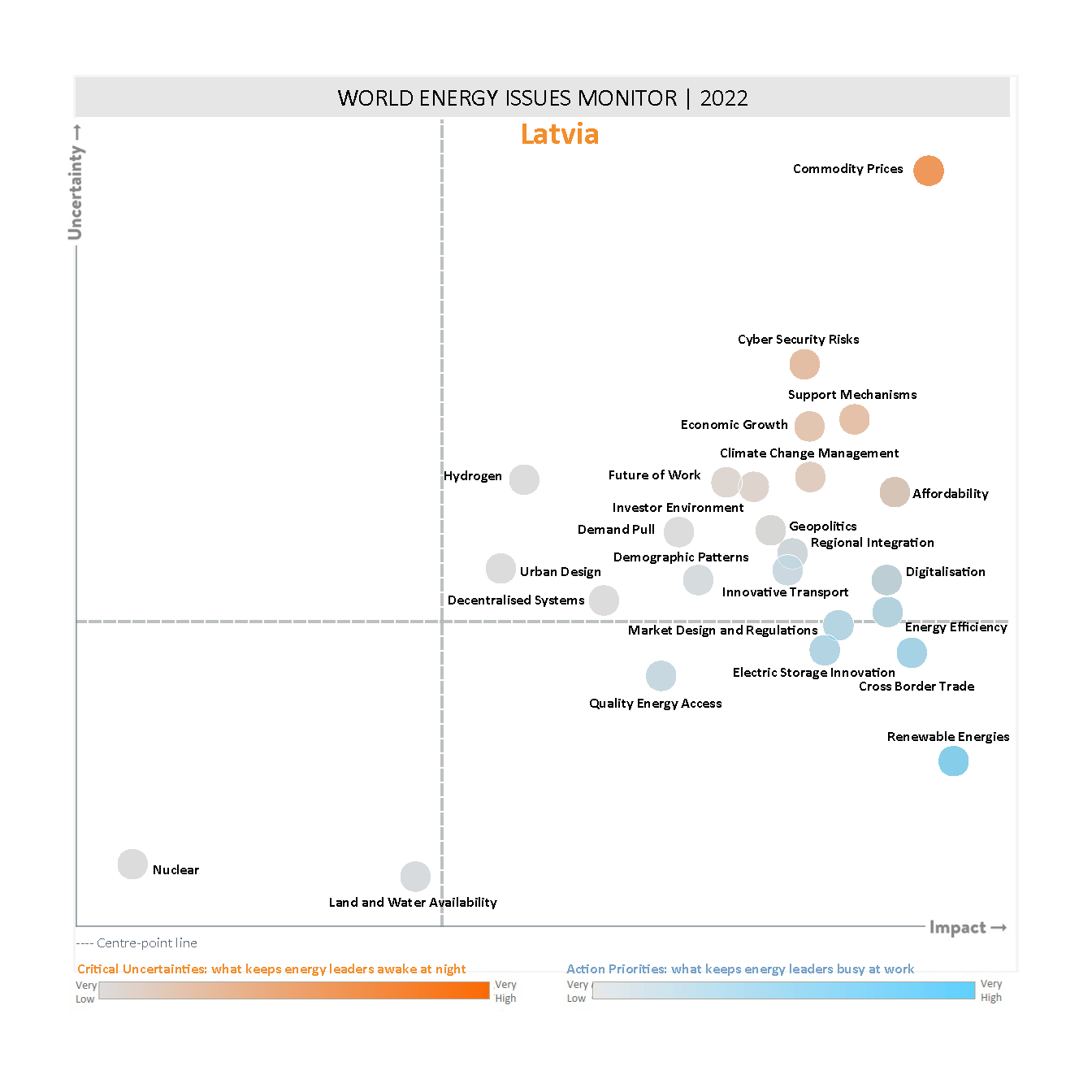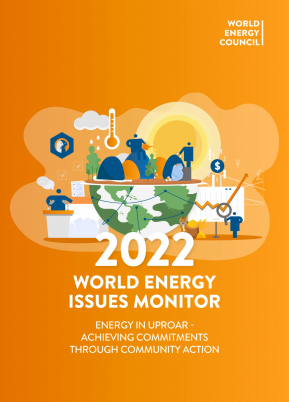The main tasks of the Latvian Member Committee are to cooperate with the World Energy Council and the other National Committees, as well as other national and international energy organizations; encourage domestic energy exploration, extraction, recycling and efficient use; promote the transportation of imported energy resources, conversion and use in all respects; address energy supply problems taking into account social and environmental aspects; act as an information coordinator to work with other energetic problem solving organizations; participate in congresses, assemblies, conferences, forums, and other events and to organize them; and disseminate information on its activities.
Namejs Zeltins has been the Chair of the Latvian Member Committee of the World Energy Council since 2001. He is also a Member of the European WEC Group, a Member of the Board of the National Energy Confederation, and a Professor at Riga Technical University. He is a Learned Secretary of the Nuclear Energy Competence Centre of LAS and a Member of the Advisory Editorial Board of Polish AS “Energy Policy Journal. He is the Head of the Energy Efficiency Centre, IPE LAS. His academic interests include fuel and energy complex planning, heat and gas supply systems, the energy market and energy utilisation.
Energy in Latvia

Until the outbreak of Covid-19 pandemic, Latvia's economic growth remained stable, exceeding the EU average. The Covid-19 pandemic has had a significant impact on the global and Latvian economies (Macroeconomic review of Latvia, 2021)
Recently European Commission has published “Fit for 55 package”, committing to cutting greenhouse has (GHG) emissions by at least 55% by 2030 (with previous targets of 40% GHG reduction). Latvia’s national Energy and Climate Plan could be updated in accordance with “Fit for 55 package”, strengthening Latvian commitments. Coordinated activities should be implemented to reduce GHG emissions, especially from non-emissions trading system (ETS) activities and particularly from the transport sector. It is planned to be reached by wide electrification of transport sector. Construction of Rail Baltica and increase of electric vehicles is contributing to this target. Other activities are being implemented in the field of alternative fuels, such as biomethane and hydrogen.
The level of producer prices is largely influenced by fluctuations in the producer prices of exported products, which are mainly determined by the dynamics of world raw material prices. Fluctuations in raw material supply and demand in the context of the Covid-19 pandemic have a major impact on producer prices. World energy and raw material prices rose sharply at the second part of 2021. Also, the dynamics of producer prices for products sold domestically will continue to be influenced by growth rates. (Macroeconomic review of Latvia, 2021)
According to Latvian TSO AS “Augstspreiguma tīkls” data, in 2021 electricity consumption has increased by 3.5% to 7 328 GWh, while electricity generation has increased by 1.8% to 5 610 GWh. Including 2 620 GWh from Daygava HPP, 2151 GWh – from gas cogeneration and 839 GWh – from other renewable sources. (ELECTRICITY MARKET OVERVIEW 2021, AST)
The important project to be implemented before 2025 is the synchronisation of Baltic power system with European continental network (ECN) as well as several projects to connect Baltic gas grid with the one of Polish gas grids. Latvian TSO together with other regional TSOs is implementing preparatory projects for synchronisation. It includes also market arrangement and qualification procedures for trading of ancillary services.
Taking into account the proposal to include nuclear and natural gas into the EU taxonomy, the interest in implementation of measures to increase the efficiency of natural gas cogeneration power plants and projects, such as SMR (small modular reactors) is growing in the region. Another reflection is an interest in diversifying the use of gas grid by allowing alternative gases, such as biomethane and hydrogen. It could be an opportunity to improve the taxonomic compliance of natural gas cogeneration plants and decarbonise the energy sector, industry and transport. The CO2 capture, use and storage (CCUS) research project is also in focus on Latvian entrepreneurs. This is also driven by European directives, for example about the use of SAF (synthetic aviation fuel).
The most common renewable energy sources in Latvia are biomass and hydropower. Opportunities to develop wind power and solar energy segments are still open. To achieve the target, set for Latvia in EU RES (Renewable Energy Sources) Directive, it is necessary to use the existing potential and evaluate the additional possibilities offered by the RES Directive, like improvement of the net accounting system of electronic energy, introduction of statistical transmission of RES, joint projects and harmonized state support schemes. (Latvian Country Commentary, World Energy Issues Monitor 2021)
To boost economic growth and mitigate the effects of the Covid-19 crisis, entrepreneurs will also have access to several support programmes in 2022, contributing to economic transformation, productivity and digitisation, housing affordability, reducing inequalities, including rental and social housing, as well as energy efficiency. In 2022 there are plans to launch the Recovery and Resilience Facility Plan and the EU Structural Funds support programmes for the new programming period for a total of over 1.6 billion euro in four investment directions – business digitisation, economic transformation and productivity promotion, reduction of regional inequalities, as well as mitigation of climate change and improvement of energy efficiency. (Economic development of Latvia, Ministry of Economics of Republic of Latvia, 2021)
Testing Perspectives with the WEC LATVIA member community
The results of the World Energy Issues Survey were discussed with WEC Latvia members in February 2022. During the discussion, the key findings regarding Action Priorities and Critical Uncertainties were confirmed and the following three theses were highlighted:
- The most important measures concern the synchronisation of the Baltic power systems with European continental network, the common energy market and energy security issues. In a cross-border context, it is important to coordinate actions between the Baltic States that affect not only infrastructure and electricity connections, but also about qualification procedures and markets for ancillary services (FCR, aFRR, FRR, inertia, etc.).
- Latvia is interested in active participation in the implementation of international and regional cooperation activities, for example in implementation of regional SMR, CCUS and P2X projects. By engaging in cross-border activities, Latvia has a better chance of successfully defending national interests in developing joint solutions with other member states in the region.
- Promoting the development of the climate neutral economy in a sustainable, competitive, cost-effective, safe and market-based way, by improving energy security and public welfare is important part of Latvian National Energy sector development. Ensuring transition to sustainable, renewable and innovative resources, ensuring equal access to energy for all groups of society are an essential condition for achieving the objectives of the Latvian National Energy and Climate Plan 2021-2030.
Acknowledgements
Latvia Member Committee
Gita Actina
Downloads

Latvia Energy Issues Monitor 2022
Download PDF
World Energy Issues Monitor 2022
Download PDF






_368_520_s_c1_c_c.png)





